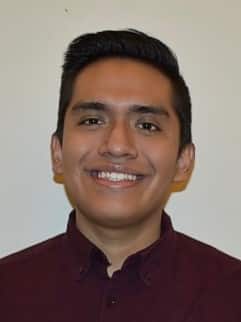 Anthony D. Rivera-Rosario, a 2022 graduate of Rutgers’ School of Arts and Sciences (SAS), was raised with the value of making a difference by helping others. The Livingston Alumni Association (LAA) of Rutgers University-New Brunswick has honored Rivera-Rosario as one of two recipients of the Riki Jacobs Livingston Pride Award for 2022.
Anthony D. Rivera-Rosario, a 2022 graduate of Rutgers’ School of Arts and Sciences (SAS), was raised with the value of making a difference by helping others. The Livingston Alumni Association (LAA) of Rutgers University-New Brunswick has honored Rivera-Rosario as one of two recipients of the Riki Jacobs Livingston Pride Award for 2022.
Rivera-Rosario, of Union City, New Jersey, majored in mathematics at Rutgers, and minored in statistics and philosophy. He is a first-generation Hispanic/Latino college student.
He worked as a research assistant at Rutgers’ Proteomics Biochemical Laboratory throughout his college career. In the lab, he conducted protein synthetic and antibiotic experiments with graduate students, and programmed laboratory inventory and formatting protocols/material safety data sheets using the computer language Python.
He has worked as a financial analyst at Bank of America since June 2022, using his skills in computer programming, process improvement, and financial planning and modeling.
At Rutgers and in Union City, Rivera-Rosario has learned “the satisfaction of seeing how one’s hard work can make a difference in someone’s life” through multiple volunteer opportunities. He coordinated many of these events as an executive board member of the service fraternity Alpha Phi Omega.
In his Pride Award essay, Rivera-Rosario highlighted some of these volunteer efforts. They include:
- Spending the day with special-needs students at the Rutgers Special Friends Day event, making strong connections by playing board games and watching movies together.
- Volunteering with his family to clean, organize, and plant new flowers at a hospital.
- Serving meals at food pantries.
- Building homes with Habitat for Humanity.
- Creating personalized cards for hospital patients.
“Each member would be assigned a patient and get a quick summary of the patient’s diagnosis and what their interests are,” he said. “After taking a few hours to create the card, we would send them to the hospital to get distributed. In return, the patients would convey their gratitude to us for thinking of them. This is an example that allows me to put reality into perspective, every life is precious, and exchanging words of positivity with one another can make everyone feel cheerful.”
Rivera-Rosario is a graduate of the Academy for Enrichment and Advancement (high school) in Union City, where he organized a Hudson County science fair, orchestrated events inspired by Italian culture, tutored students, and worked closely with the school’s office staff.
While in college, Rivera-Rosario returned to his high school (now known as the José Martí STEM Academy) to mentor students, judge a science fair, and develop an alumni networking platform.
He has earned certificates in peer health education, digital marketing, and Google Analytics. He has been honored by the Hispanic Heritage Fund and the National Society of Leadership and Success, both in 2021.
“Bringing about a change to the world does not necessarily mean doing something universal,” Rivera-Rosario wrote in his award essay. “Even helping out one person can change someone’s well-being for the better. … To this day I am passionate about serving the Rutgers community and the world. I would not be the person I am today without the help of others who came before me, and I wish to impart the same mentality to those I help so that the cycle of helping continues.”
Riki E. Jacobs (1957-2009) was the director of the Hyacinth Foundation, an AIDS support organization, among many roles she fulfilled to assist vulnerable populations. She also was one of LAA’s first Livingston College Distinguished Alumni, honored in 2000.


